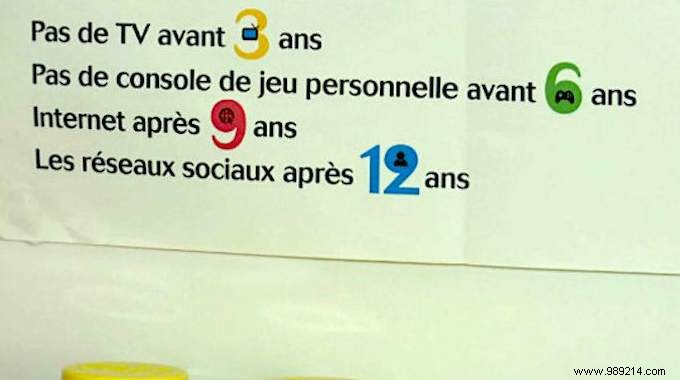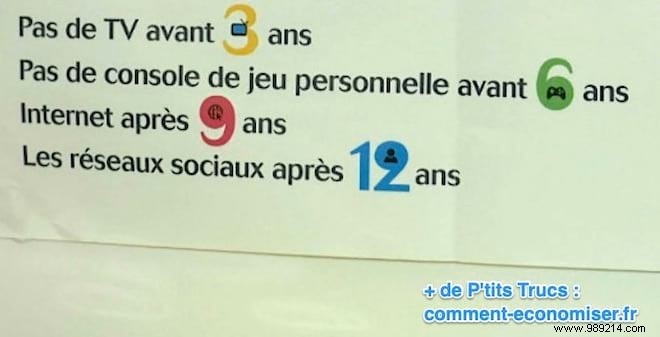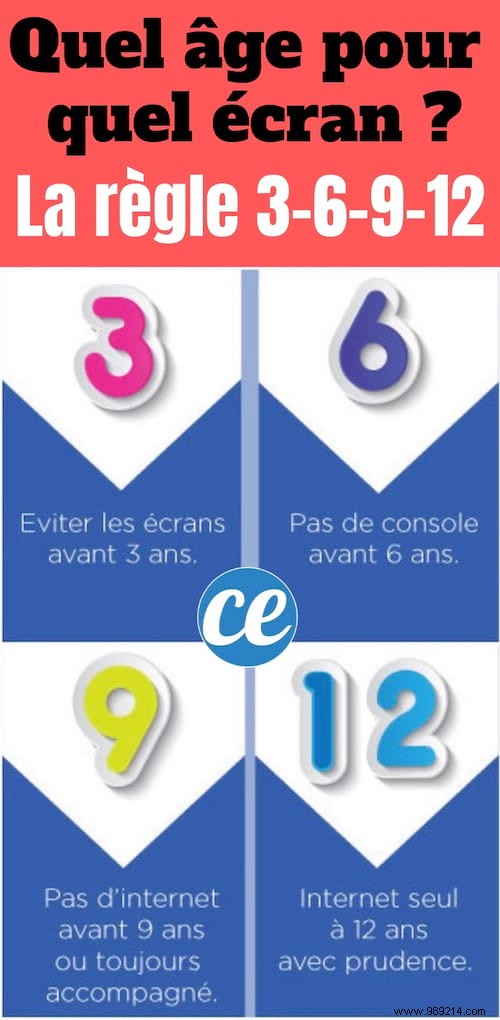
Tablets, smartphones, game consoles or computers...
Children's overexposure to screens is not without risks for their health and development.
Scientists are constantly warning and informing parents about the dangers of screens.
That's why a campaign called 3-6-9-12 was launched to raise awareness among parents.
The goal of this campaign is to limit excesses and prevent children from spending too much time in front of screens.
Because the dangers are very real:overweight, myopia, problems with sleep and school results, language delays, attention and behavior disorders.
Here is the 3-6-9-12 rule against overexposure of children to screens . Watch:

It must be recognized that the position of parents in front of screens is not always easy!
Regardless of the age of the children, parents must constantly play policeman and ensure that screen time does not exceed certain limits.
Not always easy... Let's admit that it's very tempting to leave them for long hours in front of the screens to have peace or to avoid a new conflict.
However, these hours spent in front of a TV or a tablet have very concrete consequences that can result in developmental delays.
Thus, Anne-Lise Ducanda, maternal and child protection doctor from Évry, in Essonne, testifies to the effects of screens on the brains of children.
More and more children who come for a consultation find it difficult to understand simple instructions, to simply run or to climb...

Professionals are well aware that it is not possible to completely ban screens.
That wouldn't necessarily be doing the kids a favor.
But, in the family setting, it is possible to set limits so that the screens have a fair place.
It is for this reason that Serge Tisseron, psychiatrist, created the 3-6-9-12 rule .
These are benchmarks:they help set rules about screen time in every family.
For specialists, the rule to follow is:
- before 3 years, no TV,
- before 6 years old, no game console,
- before 9 years old, no Internet access,
- under 12, no social media.
As Serge Tisseron points out, there are 4 benchmarks to remember:
"3 years, entry into kindergarten; 6 years, entry into CP; 8-9 years, the age when the child masters reading and writing in principle; and finally the transition to college at 11 years old , soon followed by adolescence."
Some psychologists go further. They believe that the first smartphone should not be offered to teenagers before entering high school.
For its part, the Superior Audiovisual Council (CSA) confirms that children under 3 should not be exposed to screens at all.
The CSA adds that an 8-year-old child has nothing to do in front of a television news.
Only programs suitable for young people should be allowed to him:"It can be animation, films for children but also educational programs or documentaries", he specifies.
With these rules in place, you may wonder how much screen time should be allowed based on your child's age.
Whether your child is 5, 8, 10, or 13...the amount of screen time allowed varies.
To get an idea of how much time a child can spend in front of a screen, some professionals, like child psychiatrist Stéphane Clerget, recommend a simple trick:
- 1 hour of screen per year and per week without ever exceeding 1 p.m. in the week.
Eg: a 5-year-old child is entitled to 5 hours of screen time per week, an 8-year-old child can be in front of a screen for 8 hours per week etc...
If you are interested in the subject and want more information on the consequences of children's exposure to screens, you can download the "prevention" poster for free here.
We also recommend Serge Tisseron's book:3-6-9-12 Taming screens and growing up.